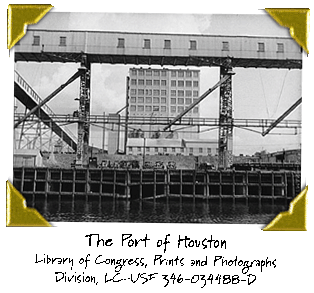

Home
| Contents | Next
History Hits Close to Home
“No
man is an island,” the old saying goes. This adage held
true for the men and women of Independence Heights as
national and world events affected their lives. Two
events that greatly impacted the community were the
Great Depression and World War II.
|
| _____Vivian
Seals completed high school in 1933, at the peak of the
Great Depression. Financial difficulties abounded, and she
remembers, “I had no idea how I was going to go to college,
but I was determined to go.” The congregation at Concord
Baptist Church awarded her the fifty dollars necessary to
register for her first semester at Houston Colored Junior
College. Furthering her good fortune, during Mrs. Seals’
first semester as a college student, “President Roosevelt
started a program called NYA, National Youth Administration.”
This program paid college tuition for students who worked
in exchange for the funds. Mrs. Seals worked
in the college’s registrar’s office, as part of the work
study program funded by the NYA. These opportunities and
her own hard work enabled her to earn her college education. |
|
_____Mary
Lee Taylor, on the other hand, does not remember the Great
Depression having a tremendous impact on her family because
they were so self-sufficient. “My mom did everything,”
say Mrs. Taylor, referring to the garden and animals her
mother kept, as well as her ability to fix things around
the house.
_____Both
Mrs. Seals’ and Mrs. Taylor’s stories about the Great
Depression mirror broader trends across Texas. For Houston
area African Americans, the effects of the Depression
were magnified because services to African American communities
were reduced, and additionally, whites began staffing
jobs typically filled by blacks.
|
 |
|
|
_____The
residents of Independence Heights, as in most American cities,
were shocked by the Japanese attack on Pearl Harbor. Helena
Allen remembers that when the attack occurred, “Nobody knew
where Pearl Harbor was.” She and other residents such as
Lota McCullough Charles quickly learned Pearl Harbor’s location
along with many other places in the Pacific. One of Mrs.
Charles’ brothers joined the Navy and was stationed in the
Pacific while her other brother served with the Army in
Europe. World War II took Mrs. Allen’s loved ones away as
well. She explains that she and her husband “married on
a Monday and he left that Wednesday night, which was Thanksgiving
eve, and it was twenty-seven months before I saw him again.” |
| _____Despite
the sadness caused by WWII, Mrs. Allen remembers the outcome
having positive effects on many African Americans. “[The
service] gave a lot of people a chance to get the things
they wanted out of life.” She goes on, “They would go back
to school and get decent jobs and come back here and pay
on a home.” Moreover, World War II provided many African
Americans with the will to fight for their civil rights.
After fighting to make the world safe for democracy, former
soldiers returned to the United States and fought to receive
equal rights at home. |
|
Home
| Contents | Back to Top
Next
|
 |